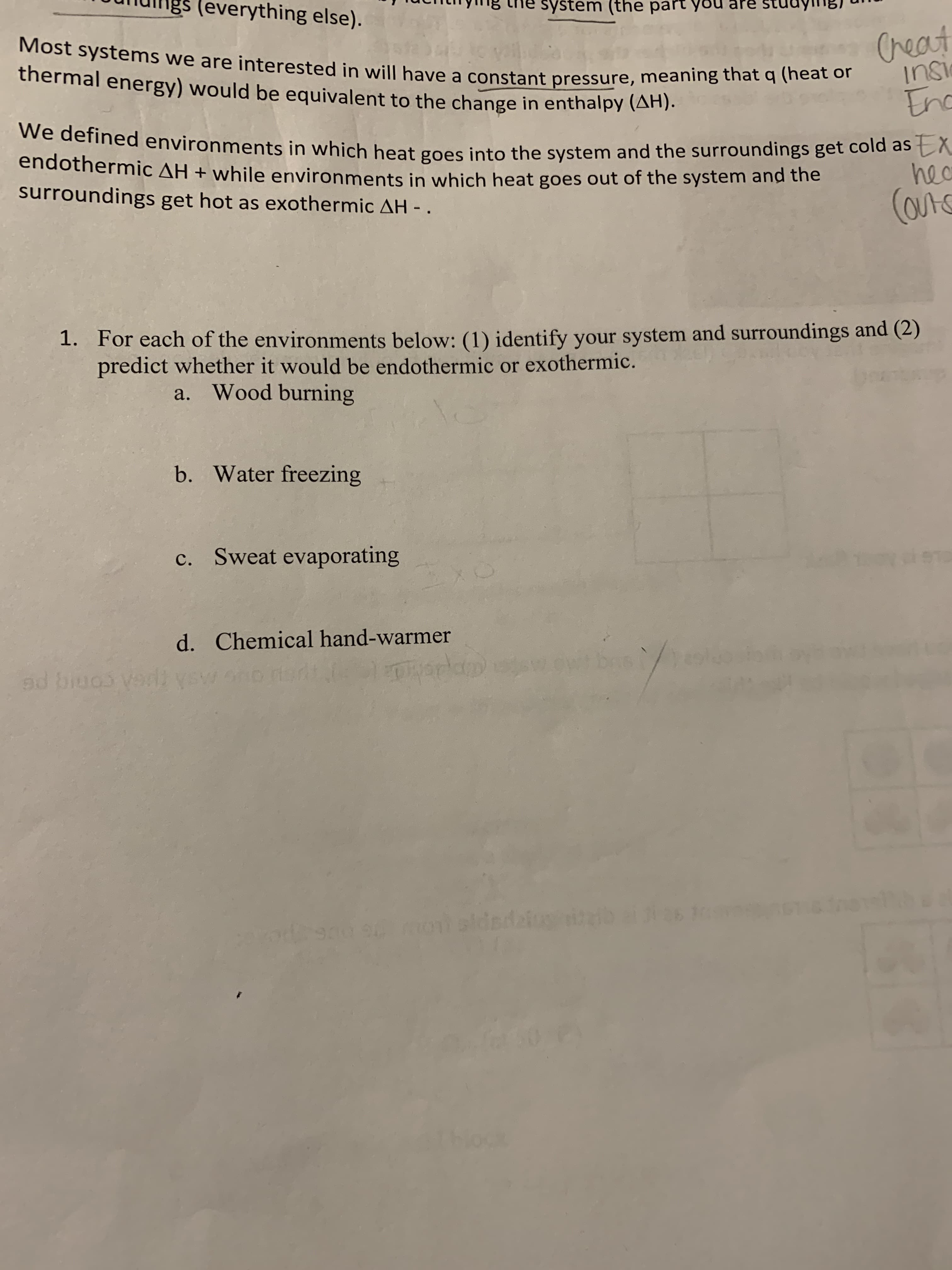lgs everything else). e system (the part you are studyml (reaut nsi ost systems we are interested in will have a constant pressure, mean ing that q (heat or thermal energy) would be equivalent to the change in enthalpy (AH) We defined environments in which heat goes into the system surroundings get hot as exothermic ΔΗ- and the surroundings get cold as EX rmic AH + while environments in which heat goes out of the system and the For each of the environments below: (1) identify your system and surroundings and (2) predict whether it would be endothermic or exothermic. 1. a. Wood burning b. Water freezing c. Sweat evaporating d. Chemical hand-warmer
lgs everything else). e system (the part you are studyml (reaut nsi ost systems we are interested in will have a constant pressure, mean ing that q (heat or thermal energy) would be equivalent to the change in enthalpy (AH) We defined environments in which heat goes into the system surroundings get hot as exothermic ΔΗ- and the surroundings get cold as EX rmic AH + while environments in which heat goes out of the system and the For each of the environments below: (1) identify your system and surroundings and (2) predict whether it would be endothermic or exothermic. 1. a. Wood burning b. Water freezing c. Sweat evaporating d. Chemical hand-warmer
General Chemistry - Standalone book (MindTap Course List)
11th Edition
ISBN:9781305580343
Author:Steven D. Gammon, Ebbing, Darrell Ebbing, Steven D., Darrell; Gammon, Darrell Ebbing; Steven D. Gammon, Darrell D.; Gammon, Ebbing; Steven D. Gammon; Darrell
Publisher:Steven D. Gammon, Ebbing, Darrell Ebbing, Steven D., Darrell; Gammon, Darrell Ebbing; Steven D. Gammon, Darrell D.; Gammon, Ebbing; Steven D. Gammon; Darrell
Chapter6: Thermochemisty
Section: Chapter Questions
Problem 6.132QP
Related questions
Question

Transcribed Image Text:lgs everything else).
e system (the part you are studyml
(reaut
nsi
ost systems we are interested in will have a constant pressure, mean
ing that q (heat or
thermal energy) would be equivalent to the change in enthalpy (AH)
We defined environments in which heat goes into the system
surroundings get hot as exothermic ΔΗ-
and the surroundings get cold as EX
rmic AH + while environments in which heat goes out of the system and the
For each of the environments below: (1) identify your system and surroundings and (2)
predict whether it would be endothermic or exothermic.
1.
a. Wood burning
b. Water freezing
c. Sweat evaporating
d. Chemical hand-warmer
Expert Solution
This question has been solved!
Explore an expertly crafted, step-by-step solution for a thorough understanding of key concepts.
This is a popular solution!
Trending now
This is a popular solution!
Step by step
Solved in 6 steps

Recommended textbooks for you

General Chemistry - Standalone book (MindTap Cour…
Chemistry
ISBN:
9781305580343
Author:
Steven D. Gammon, Ebbing, Darrell Ebbing, Steven D., Darrell; Gammon, Darrell Ebbing; Steven D. Gammon, Darrell D.; Gammon, Ebbing; Steven D. Gammon; Darrell
Publisher:
Cengage Learning

Chemistry for Engineering Students
Chemistry
ISBN:
9781337398909
Author:
Lawrence S. Brown, Tom Holme
Publisher:
Cengage Learning

Chemistry: Principles and Practice
Chemistry
ISBN:
9780534420123
Author:
Daniel L. Reger, Scott R. Goode, David W. Ball, Edward Mercer
Publisher:
Cengage Learning

General Chemistry - Standalone book (MindTap Cour…
Chemistry
ISBN:
9781305580343
Author:
Steven D. Gammon, Ebbing, Darrell Ebbing, Steven D., Darrell; Gammon, Darrell Ebbing; Steven D. Gammon, Darrell D.; Gammon, Ebbing; Steven D. Gammon; Darrell
Publisher:
Cengage Learning

Chemistry for Engineering Students
Chemistry
ISBN:
9781337398909
Author:
Lawrence S. Brown, Tom Holme
Publisher:
Cengage Learning

Chemistry: Principles and Practice
Chemistry
ISBN:
9780534420123
Author:
Daniel L. Reger, Scott R. Goode, David W. Ball, Edward Mercer
Publisher:
Cengage Learning

Principles of Modern Chemistry
Chemistry
ISBN:
9781305079113
Author:
David W. Oxtoby, H. Pat Gillis, Laurie J. Butler
Publisher:
Cengage Learning

Chemistry: Principles and Reactions
Chemistry
ISBN:
9781305079373
Author:
William L. Masterton, Cecile N. Hurley
Publisher:
Cengage Learning

Chemistry: An Atoms First Approach
Chemistry
ISBN:
9781305079243
Author:
Steven S. Zumdahl, Susan A. Zumdahl
Publisher:
Cengage Learning